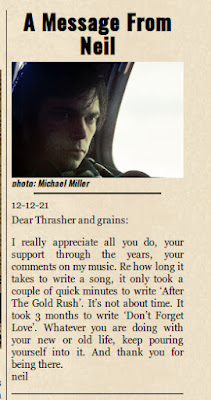Comment of The Moment: "Alabama" & Neil Young's "Harvest Time" Film

"Alabama"
NYA Vol #1 Boxset Photo by Joel Bernstein
In the film Neil Young's 'Harvest Time', there are extensive scenes from The Barn of the recording of the song "Alabama", as well as, Neil discussing the song as "not a political statement" but a song "about himself".
In other words, Neil Young is downplaying the whole "Southern Man" and "Alabama"
This statement by Neil Young is downplaying the whole politics of "Southern Man" and "Alabama" in 1971 is obviously well before it became a legendary myth feud with Lynyrd Skynyrd's iconic "Sweet Home Alabama".


Ronnie Van Zant with Neil Young "Tonight's The Night" T-shirt
Oakland Coliseum, July 2, 1977 - Photo by Michael Zagaris
Neil Young with Lynyrd Skynyrd/Jack Daniels Whiskey T-Shirt
Verona, Italy 7.9.1982 - Photo by Paolo Brillo on Flickr
In fact, the quotes in the film make it sound like Neil could of picked the State of Mississippi randomly, but probably found just that Alabama worked much better lyrically. Neil Young (paraphrased from memory):
“I just wanted to use the name of a state in the American South. Because that’s where the guy is coming from in that song. It’s not necessarily about Alabama.” And then, “I don’t know what I’m talking about.”Which brings us yet again, to another TW Comment of The Moment on the post REVIEW: Neil Young's Harvest 50th Anniversary Edition (CD/DVD) | All About Jazz by Tomatron:
Many thanks for the CotM Tomatron. Man, this is right in our strike zone here @ TW.
As everyone knows, this whole subject of the Southern Man/Northern Man is what propelled this site from obscurity to relative prominence and then back to semi-obscurity.
We had always suspected that Neil distanced himself from this whole fraught subject just because of the challenge of discussing and defending in the climate extremes we face. So, frankly, it is very good to understand that this apparent backtracking -- so to speak -- occurred in the early 70's and isn't a more modern revisionist thinking/justification. In his autobiography "Waging Heavy Peace", Neil Young writes that "Alabama" was "condescending" and "not entirely thought out".
But, we ask, are the "politics" of today really any dicier than the 60's?
Labels: film, harvest, harvest time, lynyrd Skynyrd, neil young, southern man, sweet home alabama

































 Human Highway
Human Highway

















 Concert Review of the Moment
Concert Review of the Moment





 This Land is My Land
This Land is My Land

 FREEDOM In A New Year
FREEDOM In A New Year









 *Thanks Neil!*
*Thanks Neil!*




![[EFC Blue Ribbon - Free Speech Online]](http://www.thrasherswheat.org/gifs/free-speech.gif)











 The Unbearable Lightness of Being Neil Young
The Unbearable Lightness of Being Neil Young Pardon My Heart
Pardon My Heart



 "We're The Ones
"We're The Ones  Thanks for Supporting Thrasher's Wheat!
Thanks for Supporting Thrasher's Wheat!




 This blog
This blog 
 (... he didn't kill himself either...)
#AaronDidntKillHimself
(... he didn't kill himself either...)
#AaronDidntKillHimself









































































 Neil Young's Moon Songs
Neil Young's Moon Songs




 Civic Duty Is Not Terrorism
Civic Duty Is Not Terrorism Orwell (and Grandpa) Was Right
Orwell (and Grandpa) Was Right


 What's So Funny About
What's So Funny About 



Given the insight added by the Harvest Time quote regarding Alabama, the song can be seen in, if not a brand new light, a more complex one, where it is elevated above its status of Southern Man II. It seems like the self-referential lines begin to incorporate more nods to Southern and country culture as the verses add up.
At first, the subject is primarily Neil himself, dropping minor allusions to keep that country tone going (“the devil fools with…” “swing low,”) as he expresses his personal feelings at the end of March ‘71 [NYA manuscript caption]. “You got the spare change, you got to feel strange” is his ambivalent mood about being a “rich hippie.” “And now the moment is all that it meant” sounds like a critique of a hippieism itself. In the original manuscript, Neil put the word “moment” in quotes, tellingly.
Where Southern Man was a straightforward social commentary and political statement, Alabama is a metacognitive meditation, a critique/questioning of self.
Here the singer sings to himself, playfully naming himself “Alabama.” He recognizes that he is affecting an American style, all the while an outsider. This perspective will be developed in a later line, so let’s look at that chorus first. Rusties will recognize the references to self right out the gate. “…weight on your shoulders that’s breaking your back,” was written between Neil’s major back injury and the resultant surgery. We know he was in physical pain during this time and would hardly stand up with an electric guitar until months later.
“Your Cadillac has got a wheel in the ditch and a wheel on the track.” Know anyone with a fondness for big old cars and ditches? [note: The first Caddy I could find in Special Deluxe was the limo he bought in ‘74 when he and Zeke were on the road with the CSNY tour.]
The next verse names Alabama as the person/subject and, separately, as the place itself (“broken glass windows down in Alabama”) The irony of banjos playing through these broken windows but that also “take you down home” speaks to the personal conflict already established and connects it to the character’s namesake state. The chorus returns, reinforcing the pain and strife of the singer/his subject. The final verse brings back Neil’s discomfort with fame living in the States. “Oh Alabama, can I see you and shake your hand?” is followed by the wry “make friends down in Alabama.” These lines bring to mind Neil’s comment in Harvest Time regarding his new famous life, where people’s eyes don’t look right when they talk to him. [Again sorry for the lack of direct quotes, I’m paraphrasing from memory of the screening last weekend.]
“I’m from a new land, I come to you and see all this ruin, what are you doing?” Another enigmatic line, but following the lyrics above, it seems he is stepping out of the Alabama identity and into the world of Southern Man, having established his own voice as full of contradiction and self-doubt. This seems to add the weight of credibility based in humility to the critical observations first laid out with “see the old folks tied in white ropes.” In fact, that particular line can be read not just as “them Southern folk are KKK,” but that they themselves are tied up, bound by the shameful side of their own heritage, unable to change. The ropes themselves are white, after all.
After asking “what are you doing?” Alabama closes with another question: “You got the rest of the union to help you along/ What’s going wrong?” A mere Southern Man retread would have left this line a reaching throwaway. It doesn’t quite make sense posed directly to the state of Alabama. But given a double meaning whose main purpose is an inward questioning, the line lands hard. We can easily see “the rest of the union” as CSN, Crazy Horse, or even the Stray Gators, from all of whom Neil has begun to isolate himself. He knows they support him, so why is he struggling? It’s worth noting that Neil had expected to be finished with Harvest by April [an offhand remark heard in the movie]. Alabama was written on March 30th, 1971 and no more recording was done until September.
When Alabama was penned, it wasn’t quite Harvest Time yet.